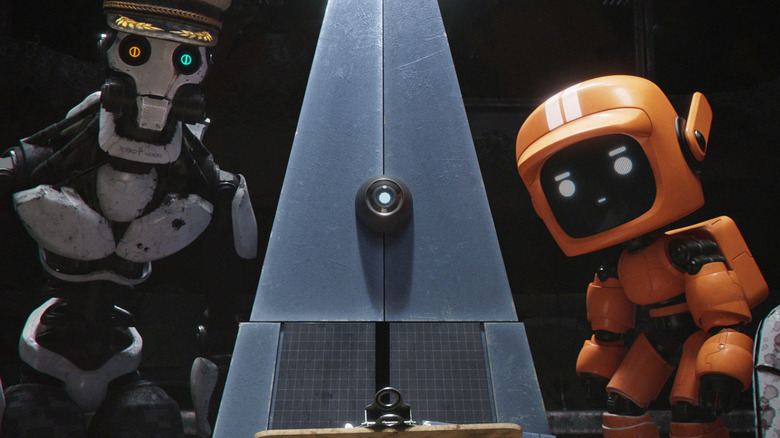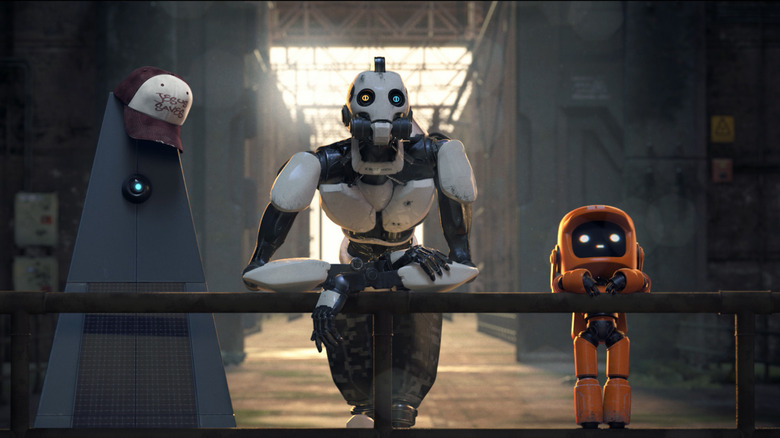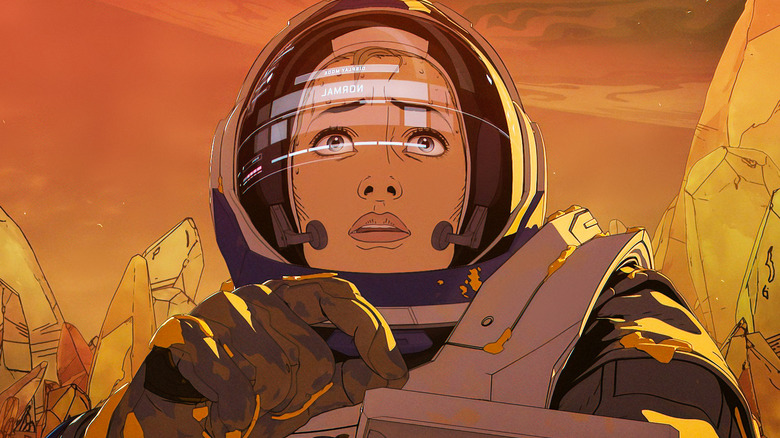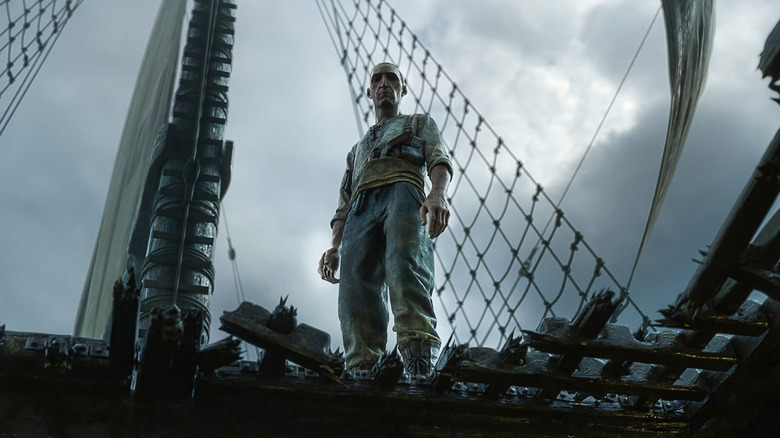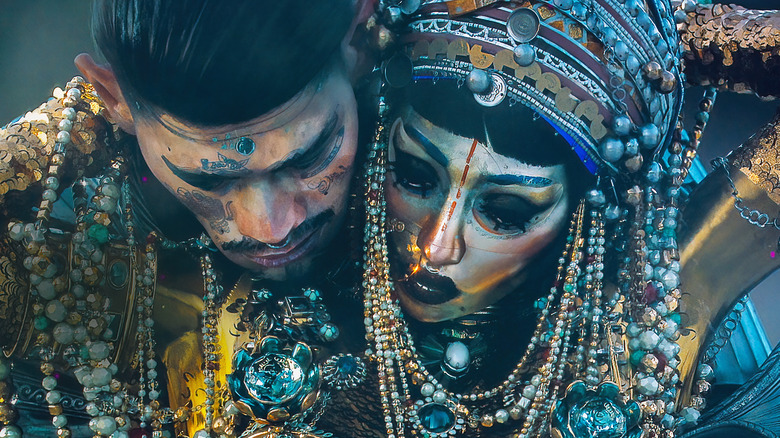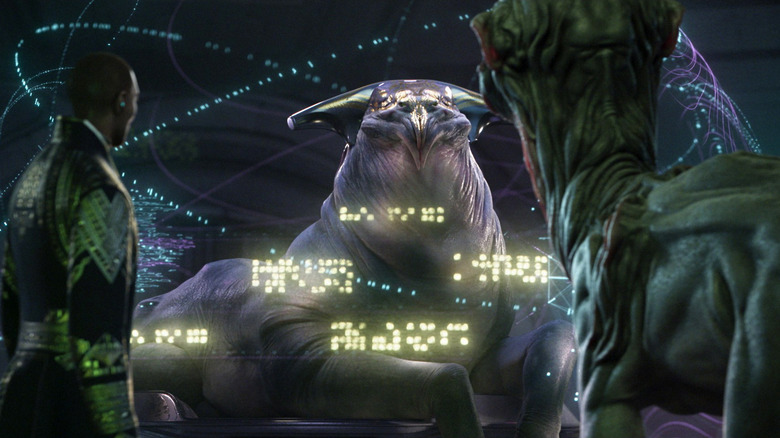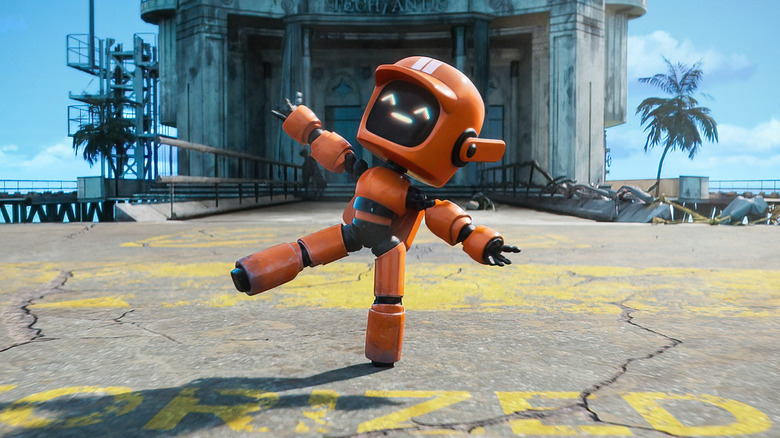Love, Death And Robots Creators Tim Miller And Jennifer Yuh Nelson On Season 3 And The Future Of Animation [Interview]
The Netflix animated anthology series "Love, Death and Robots" is back for a third season, and this time the show is bringing back some old favorites. The upcoming season (or "volume") features eight all-new shorts, and one of them is a direct sequel to the beloved "Three Robots" entry from season 1, featuring the three hilarious robots who try to figure out why humanity went extinct. Executive producers Tim Miller, David Fincher, and Jennifer Yuh Nelson all set out to make a creative sandbox for animators to go wild within, and Fincher even makes his animation directing debut with this season's episode "Bad Travelling." Miller and Yuh Nelson each directed an episode as well, with Miller stepping in to adapt Bruce Sterling's short story "Swarm" and Yuh Miller directing the "Expendables"-esque "Kill Team Kill."
Fans might know Miller best as the director of "Deadpool," and Yuh Nelson directed "Kung Fu Panda 2" and "Kung Fu Panda 3," which makes them an unusual pair to tackle an adult animated anthology series. But that variety of experience might be what makes their collaboration so great. I had a chance to sit down via Zoom with Miller and Yuh Nelson to chat about "Love, Death and Robots" season 3, what we can expect, and why animation is such an incredible medium.
This interview has been lightly edited for clarity.
'They're very nice robots, as robots go'
We have our first direct sequel episode in this round of "Love, Death and Robots." The three snarky robots come back and I was wondering, how does it feel to have them back and what should fans expect?
Yuh Nelson: Well, I think the three robots were such fan favorites and people were getting tattoos of them and such that they seemed like a natural thing to bring back. People loved them and we wanted to just give something to the fans. And also they're favorites of John Scalzi, who we work with all the time. And it's just easy for him to slide back into those same characters again.
Miller: You say snarky, I say incisive social commentary with a sense of humor, but they're very nice robots, as robots go. We really just wanted an excuse to work with John again. That's pretty much it.
There are so many different stories and styles in Love, Death and Robots. How did you two decide which ones you wanted to have in this collection?
Yuh Nelson: I think it's always about a mix because you want the realistic ones, but you also want to have 2D hand-drawn episodes. And it comes down to all these directors in studios that we work with have their specialization, and we wanted them to be able to do what they do best. And so when we put that into account with the stories and then mix the stories around, then it sort of works itself out.
Miller: Yeah. And then for the final round, it's just a knife fight between Jennifer and I. She has one she wants, I have one I want, there's two rusty knives in a pit.
Yuh Nelson: We have scars everywhere.
Miller: Whoever wins.
'It doesn't have to fit in a certain genre'
We've come a really long way since something like "The Animatrix," and animated anthology shows are actually starting to trend. Y'all were one of the first, but they're really starting to come along. What do you think the future for animation holds?
Yuh Nelson: Well, what I hope is that people will look at animation as being this wide open field where you can do any kind of story in any style that you want, that it doesn't have to fit in a certain genre. It is amazing piece of art technique. It's what all these artists wanted to do, all these directors wanted to do. To finally be able to do it and have as many opportunities as we do now is really great.
Miller: And I think there's a lot of energy focused now on achieving that last bit of reality and crossing the uncanny valley, which means you really can tell any sorts of stories. But when I think of animation, I think [of] the kinds of stories that you can tell [which] can't be told in other mediums. And I hope that most of the stories that we're choosing feel like they should be told with this particular medium, because they would be hard to tell on any other.
David Fincher is 'a big fan of animation'
How did you convince David Fincher to hop on board and direct his first animated short?
Yuh Nelson: Did you have to convince him?
Miller: He's been waiting 12 years to do this. I think he wanted to see that we didn't f*** it up in season 1. And then he said, "I'm ready to come in." He's a big fan of animation. And back when I met him, he came down to the studio. He loved what we did. And then when I showed him a bunch of different projects, "Heavy Metal" was the one he gravitated towards. He loves the experimental nature of it. He loves the idea of doing things that haven't been done. I think particularly when you have a short, like "Jibaro" or something, David loves that idea of people seeing something they haven't seen before.
'One of the most amazing pieces of animation I've ever seen'
I was actually about to ask you about "Jibaro." Oscar and Emmy-winning animator Albert Mielgo is back, and his story of a siren and a deaf warrior is so different from anything else we've seen, even his previous entry. What drew you towards going with something that experimental?
Yuh Nelson: I think Alberto came to us and said, "This is what I want to do." He had talked about bringing this illuminated painting to life, this medieval sort of siren story. He wanted do something he hadn't done before, which is why it looks very different from "Witness." It's not urban. His style is very present, but it's foliage and forest and nature that he hadn't done before. All this level of complexity with horses and water and armor and all this, it was incredibly challenging and he knew it was going to be hard.
Miller: But just in case — if you thought that he may come in and offer us sort of a tasting menu of stories from which we choose, that's not the way it works. He comes in and says, "This is what I want to do. I have a story about this." And then he pitches it and it's weird as f***, but you trust him because "The Witness" was, until "Jibaro" came in, one of the most amazing pieces of animation I've ever seen. You know those things where you remember where you were when you saw it the first time? I remember where I was when I saw the finished shots of "The Witness." And then Jen, when the first-look development from "Jibaro" came in, Jen it forwarded to me and said, "Holy f***ing s***." That was it. That's just it.
'Evolutionary horror' should 'be its own genre'
Tim, can you tell me a little bit about the short you directed?
Miller: I directed a short story called "Swarm" by Bruce Sterling, and it's set in a novelistic universe of his called the "Mechanist Shaper" universe. It's big sci-fi in the far future. I've been a fan of Bruce Sterling since I was in college, I'm proud to say. I think this is his first work that's been translated into another medium. I'm pretty excited about that. But mostly it's a story that takes place almost entirely in zero-G, which I think is cool. It's inside this big asteroid that has become a hive for these alien creatures. So lots of creatures, lots of really balletic zero-G action that's super cool, and a really cool evolutionary horror ending, which should be its own genre, evolutionary horror.
'There's more. We heard you and there's more.'
And finally, what would you like fans of "Love, Death and Robots" to know before going into this season?
Yuh Nelson: More.
Miller: There's more. We heard you and there's more. We knew what you wanted and we're giving it to you. No. I think that anybody that's been a fan of what we've done in the past will be a fan of this. There is such a wide variety of animation styles and stories and tones and directors and artists that we could do different things for many, many seasons and never feel like we were running out of ideas or anything. So if you like the other seasons, it's just more.
Yuh Nelson: It's David Fincher's first [animated] show.
Miller: Yeah. Yeah. David Fincher.
Yuh Nelson: Alberto comes back and we've got "Three Robots" coming back. We have an amazing, beautiful hallucinatory story directed by a female director. And it's such a cornucopia of beautiful things.
Miller: A female director who's not Jennifer.
Yuh Nelson: That's right, I did another episode.
Miller: Yes. It's beautiful.
"Love, Death, and Robots Vol. 3" is now streaming on Netflix.
